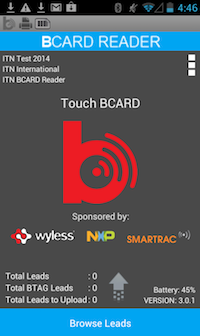A researcher discovered that a vulnerability in the badge reading app used at the recent Black Hat security conference exposed the registration details of all attendees.
The badges provided to people attending Black Hat and other conferences contain an NFC tag. When vendors scan the tag, they obtain the information provided during the registration process by the individual wearing the badge.
At Black Hat the tag was scanned using BCARD, a trade-show and conference badge reading application developed by ITN International. The app is designed to work on tablets and phones running Android or iOS.

A researcher who uses the online moniker “NinjaStyle” analyzed the BCARD application and discovered an API that could be used to obtain an attendee’s data without authentication based on the unique badgeID value assigned to each user.
NinjaStyle then conducted some tests to determine if a brute-force attack could be used to obtain information on all Black Hat attendees.
“After trying a few hundred requests on both 0-100000 and 000000-100000 and receiving no valid badges, I determined that those were likely not going to be valid ID ranges. We could then assume that valid IDs are 100000-999999. This leaves us with 900,000 total requests. With an estimated 18,000 BlackHat attendees, we can then assume that we will enumerate a valid badgeID in approximately 2% of our requests,” the researcher wrote in a blog post published on Monday.
He determined that a brute-force attack on the API would allow an attacker to obtain the names, email addresses, company names, phone numbers and addresses of all Black Hat attendees in roughly six hours.
The researcher reported his findings to ITN on August 9 and while he initially encountered some difficulties in establishing contact with the company, the issue was patched by August 13. ITN said it had addressed the vulnerability by disabling the problematic API, which it claimed had been a legacy system.
This is not the first time experts have found vulnerabilities in one of the apps used at the Black Hat conference. Back in 2016, the event’s organizers were forced to update the official application after researchers discovered several flaws that could have been exploited to impersonate users and spy on them.
Also in 2016, researchers found that the badge scanning application provided by RSA Conference organizers to vendors had been affected by a security bypass flaw caused by a default password left in the code.
Related: Thousands of Mobile Apps Leak Data from Firebase Databases
Related: Enterprise Mobile Apps Expose Sensitive Data via Backend Systems














